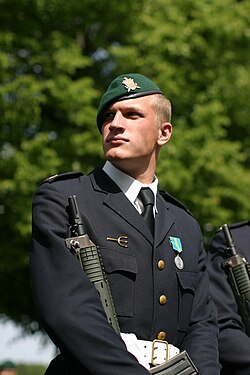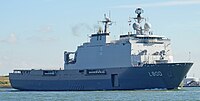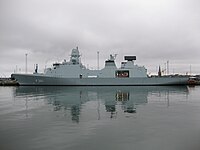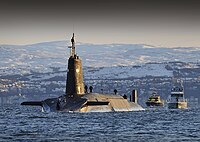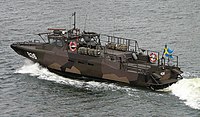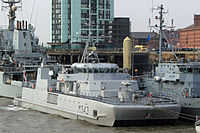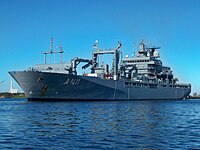Royal Sjealandic Navy
| Royal Sjealandic Navy Kongelige Sjællandske Marine | |
|---|---|
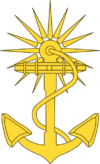 Emblem of the Royal Sjealandic Navy | |
| Active | 1270 – present |
| Country | |
| Allegiance | Frederik VI of Sjealand |
| Type | Navy |
| Role | Naval Warfare |
| Size | 58,756 regular 12,200 Conscripts 18,935 Royal Marines 851 Coastal Rangers |
| Part of | |
| Headquarters | Flådens Operative Hovedkvarter, Asgård |
| Nickname(s) | Søhestene |
| Patron | Prince of Dagmar |
| Motto(s) | A Sjealander at sea is a Sjealander at home |
| Colors | Sjealandic Blue & Gold |
| March | Honourary March for the Navy |
| Mascot(s) | The three blue sailors |
| Anniversaries | 11 July |
| Fleet (including support vessels) |
|
| Website | https://www.Flåden.sje |
| Commanders | |
| Lord High Admiral | |
| Rigsmarsk | |
| Admiral of the Fleet | |
| Serving Sealord | |
| Commander of the Fleets | |
| Insignia | |
| Naval Ensign | 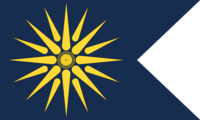 |
| Naval Jack | 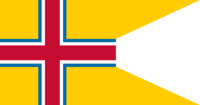 |
| Pennant of the Realm | |
The Royal Sjealandic Navy (Tynic: Kongelige Sjælandske Marine) is the sea-based branch of the Royal Sjealandic Defence responsible for naval operations of the state of Sjealand. The RSN is mainly responsible maritime patrolling and defence, maintaining Sjealandic sovereignity in the Sea of Njord and the Tynic Sea and the maintance of the coastal defence system. Other tasks include surveillance, search and rescue, icebreaking, oil spill recovery and prevention as well as contributions to international tasks and forces. In addition it is the strongest navy in Midgard and one of the two blue water navy in Aldinnheim. It is comprised of the surface and submarine naval units- the Fleet (Tynic Flåden) aswell as the Sjealandic Coastal Defence. As of 2010 the RSN consisted of 54,042 regulars and 9,200 Conscripts with a strength of 144 ships and 22 submarines.
The history of the RSN dates back to 1270 under Knud IV as the ruling monarch saw fit to create a permanent fleet of ships to supplement the Leidangsfleet of levies from across the kingdom, mainly in an effort to extend maritime control over the Tynic sea. From 1320 to 1671 the navy formed the Common Fleet together with the Ambrosian, Vasturian and Vestmannar navies through the Union of the Two Daughters. In Sjealand, vessels of the Royal Navy are given the prefix ´´KSS´´ short for Kongeligt Sjælandsk Skib (Royal Sjealandic Ship). The motto of the Sjealandic Navy is En Sjællænder på havet er en Sjællænder i hjemmet. The motto was developed in the early thirties and translated means A Sjealander at sea is a Sjealander at home. The Sjealandic Navy's emblem consists of an anchor in front of a stylized Sjealandic sun as seen in its religious iconography and coat of arms. The sun symbolizes both the Monarchy and Stórrheðrinn, the god in the Sjealandic religious philosophy of Ríkr Átrunaðr
History
The command structure of the Royal Navy is headed by the Navy Staff (Marinestaben), led by a Grand Admiral as well as the Minister for Defence, and the leading naval officers in the country. The Navy Staff make up the leading part of the Naval Operative Command (Flådens Operative Kommando), which is headquartered at Flådestation Ingborg close to the capital of Asgård. Employing 1,840 people the FOK is responsible for leading the war-time operations of the navy, peace-time exercises, maritime search and rescue, enforcing Sjealandic sovereignty in its waters, protecting the Tynic enviroment and combating pollution. In cooperation with the Tynic Commission the navy also serves to enforce the rules and regulations put in by the agreements, and to keep other nations from illegally fishing in the Tynic Sea.
Njord Sea Fleet
Flådestation Frederiksværn (Sjealand)
- 1st Carrier Battlegroup (Riget) in Flådestation Frederiksværn. Assigned for carrier operations in the Sea of Njord. Flagship is KSS Frederik VI
- 1st Reconnaissance Force (Hugin) in Flådestation Ingborg. Assigned for providing aerial and maritime surveillance operating aircraft from land bases as well as anti-submarine operations with aircraft. Flagship is KSS Trelda
- 1st Logistics Group (Admiralens) in Flådestation Frederiksværn. Providing Logistical support to the Njord Sea Fleet.
- 1st Submarine Force (Skyggen) in Flådestation Håkonsværn. Plans and coordinates submarine operations within the Sea of Njord.
- 1st Amphibious Assault Group (Havmanden) in Flådestation Ingborg. Responsible for rapid amphibious in the Sea of Njord and Tynic Sea.
- 1st Patrol Force (Hammeren) in Flådestation Frederiksværn. Surface element centered for patrol. Flagship is KSS Despenser
- 1st Mine Countermeasures Flotilla in Flådestation Draken. Assigned for anti-mine warfare. Flagship is KSS Ryderen
Langeyan Fleet
Lazarene Fleet
Galideen Expeditionary Squadron
Lua error in Module:Location_map/multi at line 27: Unable to find the specified location map definition: "Module:Location map/data/Sjealand" does not exist. The Naval Center for Logistics and Operational Support (Tynic: Marinens Center for Logistik og Operational Støtte, MCLOS) includes the mainland operational structure of the Royal Navy, spread out over its two naval bases and 6 Naval stations as well as the Tuthinan controlled Flådestation Lydum and Flådestation Verlinge.
The primary task of the naval bases is to provide a safe harbour for the navy, and to provide logistic support for the ships and vessels both during peace and war. This includes configuration, maintaining and repairing the units. Because of the Totalforsvar policy of the Royal Sjealandic Defence these bases exist within a web of pre-designated supply routes and piple lines that can be switched to only supply the naval bases. By coordinating with the Civilian Defence, Police and Home Guard the MCLOS has a well established layer of support in the areas surrounding their area of operation Furthermore the MCLOS maintains a steady supply of capable mechanics and supply staff through its own educational system and its ability to levy civilian workers in times of crisis. The naval bases of the Sjealandic navy are:
- Flådestation Ingborg is the center for operations in the Tynic Sea, as well as operational defence of the vulnerable and generally flat southern coast. The vulnerability of the Løvster and Frederikssted Peninsulas demands for quick response in coastal defense, with the 1st Squadron stationed at Flådestation Ingborg, this primarily being made up of smaller, faster ships able to quickly respond to a threat. With the Tynic Sea and Sjealands southern coast being more vulnerable to mine-laying this has also called for the mine-hunters to be stationed there, to not only keep the Grønnebugt Bay open but also to important shipping routes used by the support vessels in dock a Ingborg.
- Flådestation Frederiksværn is the largest of the naval bases and is home to the majority of the larger fighting vessels in the navy. A wish to have the fighting majority of the navy free of a potential closing of the entrance to the Tynic has kept them stationed in Nordvakt, a closed bay in Northern Sjealand. Heavily defended and with drydocks and normal docks carved into the rocks of the Nordvakt Cliffs. With the Nordvakt bay closed to the Sea of Njord and the Sea of Njord itself being a wider and more open sea, the Flådestation Nordvakt does not require the same need for fast response time as the possibilities of invasions on the Northern Coast are much more limited.
In addition to these the Royal Sjealandic Navy in cooperation with the Royal Sjealandic Army maintain three operational naval base fortresses along with 34 mothballed fortresses that can be put into operation at short notice. These are:
- Fortress Grønnebugt (Grønnebugts Kystbefæstning) is a massive complex constructed at a cost of 4 billion Rigsdaler and burrowed into a the cliffside of the entrance to Grønnebugt Bay, the bay in which Asgård is located. The fortress is equpped with 4 406mm Kystværn Cannons, of which 2 are kept operational, and the rest are only maintained for conservation purposes. The actual operational defence of the fortress is done via use of Antiskibsbatteri-23 Fæstningen a joint Sjealandic-Tuthinan development, and the Tuthinan produced A-222E Bereg-E. In addition to these controllable mines and smaller emplaced cannons are positioned along the mouth.
- Fortress Gyldensund (Gyldenbugtens Kystbefæstning) is a joint Sjealand-Hethland endeavour, and consists of a series of 150mm cannon emplacements and two units of Antiskibsbatteri-23 Fæstningen and A-222E Bereg-E on each side of the Gyldensund. Along with these the Royal Hethlandic Navy also maintains a squadron of mine-layers while the Royal Sjealandic Navy maintains controllable mines. These are in place so in the event of war the Northern Sea Defense Organisation may close the Tynic Sea.
- Fortress Nordvakt (Nordvakt Kystbefæstning) is the coastal artillery complex that protects Nordvakt Bay and Flådestation Frederiksværn
Outside the naval bases the Royal Navy maintains several naval stations across Sjealand, with more limited support functions and logistical infrastructure, but instead act as smaller stopping points for ships of the navy in need, or who require emergency support. Moreover they can act as temporary repair places in the event of battle.
Special Forces
The RSN maintains two distinct special forces, one dedicated for domestic operations and one dedicated for foreign operations.
- The Coastal Rangers is one of the oldest amphibious corpses in Esquarium, and were established in the 1680's as a regiment within the navy trained to operate in the shallow waters and islets of northern Sjealand. Today they act as the domestic special forces, well trained in operations around the Sjealandic coastline and in the local Aldinian countries, outside defence they also act as a counter-terrorism force.
- The Frogmen Corps is the corps dedicated to foreign operation and was founded in he 1950's in cooperation with Tuthina. They Frogmen Corps have gained international recognition in recent years for their tough training and the talen and professionalism shown during operations in and around Osterled and Aldinnheim.
The RSN runs 3 regular education facilities and 5 special ones, with the most famous of the original three being Marinens og Holmens Søskole Aldinnheims oldest naval education facility.
- Naval Basis Education (Marinens Grunduddannelsescenter for Sergenter og Sømænd), Nordvakt
- The Royal Naval Academy (Marinens og Holmens Søskole), Asgård
- The Naval School for Special Educations (Marinens skole for Indsatsstyrker), Nordvakt
- Naval School for Warfare and Tactics (Marines Krigsførelsesuddannelse), Nordvakt
- Naval School for Maintenance of Weapons and Gear (Marinens Skole for brug og reparation af våben og udstyr), Nordvakt
- Naval School for Damage Control (Marinens Uddannelse for Havarikontrol), Nillas
- Naval School for Mechanical Education (Marinens Mekanikeruddannelse), Skargas
- Naval School for Diving (Marinens Dykkeruddannelse), Asgård
The Sjealandic Amphibious Naval command (Kommandoen for Amfibiekrigsførelse) is the command within the RSN with orders to oversee amphibious operations within the litoral waters of Sjealand as well as commanding the Coastal Defence (Kystforsvaret). Previously known as the coastal artillery (Kystartilleriet) it underwent large restructurings in 2005 in an effort to modernize the coastal defence of Sjealand, which is one of the most important duties of the ANC thanks to the long coastline of the country as well as the large number of islands in Sjealand.
The coastal defence maintains two separate bases. The largest one is located at Lindesnes and is also the home of the Coastal Rangers, the dedicated Coastal Spec ops unit of the ANC. From Kystforsvarsstation Lindesnes the Coastal defence cab use its anti-ship missiles, controllable mines and lastly the Coastal Rangers to exercise control and maintain security in the north-western shore. Through support from marine combat units the ANC is able to quickly reinforce any of the outlying islands in hours through fast tactical insertions while the navy and the Coastal defence cooperate to slow or take down enemy vessels. Besides fast tactical insertions the coast rangers also maintain a high degree of versatility, especially in VBSS's.
The second base is located at Grønneborg, a town in southern Sjealand close to the mouth of the Grønnebugt bay. From there the coastal defence controls a series of controllable mines, anti-ship missiles as well as emplaced and hidden batteries to best defend the capital Asgård, which sits in the northern end of the bay. The ANC also owns a series of mobile coastal defence missile systems which can be deployed from a series of locations around the mouth of the bay to best engage enemy ships while recieving cover from anti-air batteries of the Royal Sjealandic Army and air cover from the Royal Sjealandic Air Force. The Antiskibsbatteri-23 Fæstningen has in a wide sense replaced earlier stationary cannon emplacements used by the ANC.
Aerial Service
Early years
Fighter aircraft
Attack aircraft
Helicopters
In cooperation with the Royal Sjealandic Air Force the RSN deploys helicopters from the 598th squadron to their naval ships. When initiated in 1962, the naval helicopters consisted of a flight of Alouette helicopters of RDAF squadron 722. Established in the fifties with support and advisors from Ainin, the corps was set up as Marinens Flyvetjeneste and procured several helicopters produced in Mondejar and Mindras.
The helicopters are primarily used on the 33 larger vessels in the RSN, the Petersen, Skjoldmø, Ærkekonge and Ramsborg classes of ships. The Petersen class serves as a command ship and the helicopters can be commanded from these in the event of an emergency. Currently 40 Lulyedep helicopters from Mindras are operated by the RSN, with 35 stationed on deck and the remaining 5 acting as reserves. The primary duties of the helicopters include Search&Rescue as well as Anti-surface-warfare.
Commanders
Havfyrste (Sealord)
- 1924-1934 Torben de Elkemar
- 1934-1941 Søren Leværd
- 1941-1949 Åke Bendtsen
- 1949-1956 Helge Tyrenberg
- 1956-1960 Stig Thorsen
- 1960-1962 Jørgen Ydemar
- 1962-1968 Thorstein Qvist
- 1968-1972 Valdemar Henriksen
- 1972-1978 Niels-Erik Andersen
- 1978-1982 Sven Knut-Eriksson
- 1982-1987 Jan Thörnqvist
- 1987-1997 Hans Christian Ulebäk
- 1997-2006 Ole Terring
- 2006-Present Ulrik Hvidemar
International operations
Since the War of the Njord, the Royal Sjealandic Navy has participated in the following operations:
| Year | Operation | Notes |
|---|---|---|
| 1983–1985 | Operation Skjöldr | The Royal Sjealandic Navy and other NFO member states deployed their navies to the nautical border between West Eisarn and East Eisarn. |
| 1987–Present | Operation Fri Syd | International operation in Northern and eastern Sirklant to keep the Lazarene Sea clear of pirates. |
| 1991 | Operation Standhaftig Modstand | NFO deployment of ships to the Tårnøerne in response to Ambrosian posturing |
| 1994 | Operation Rød Vind | Combined Sjealand-West Eisarn naval manouvers in the Tynic Sea after tensions with Suavia. |
| 1995 | Operation Tvende Fjender | East Eisarean shelling of disputed islands and Ambrosian incursion into Valmic waters cause deployment of the RSN, Sjealandic and Ambrosian ships exchange limited fire north of Ambrösihöfn. |
| 2000-2001 | Salmon War | Sjealandic and Ambrosian warships cut the nets of trawlers from the other nations. Several standoffs occur in the Sea of Njord and one Ambrosian trawler is rammed accidentally by KSS Vidar. |
| 2003-2004 | NFO Rapic Reaction Force 03 | The RSN takes command of the permant NFO naval formation after Valmark, formation is stationed in Stykkisholmur. |
| 2007-2008 | NFO Rapic Reaction Force 07 | The RSN takes command of the permant NFO naval formation after Valmark, formation is stationed in Stykkisholmur. |
| 2011-2012 | NFO Rapic Reaction Force 11 | The RSN takes command of the permant NFO naval formation after Valmark, formation is stationed in Stykkisholmur. |
| 2015-2016 | NFO Rapic Reaction Force 15 | The RSN takes command of the permant NFO naval formation after Valmark, formation is stationed in Stykkisholmur. |
| 2018 | 2018 Aldinian Crisis | Sjealandic pledges to the city-state of Harsker provokes Ambrose, as Sjealandic troops land in Harsker, the city sees urban combat between Sjealandic and Ambrosian troops, almost leading to a declaration of war. Intervention by the World Council and the Nordic League establishes an international military presence. |
| 2019-2020 | NFO Rapic Reaction Force 19 | The RSN has taken command of the permant NFO naval formation after Valmark, formation is stationed in Stykkisholmur. |
Vessels and equipment
Watercraft
Aircraft
| Name | Origin | Type | Introduced | Notes | Picture |
|---|---|---|---|---|---|
| Airplane | |||||
| R-31 Tynikian Fjoer | Template:Country data Kreissau | Attack Aircraft | 1993 | 
| |
| KF-25 Falken | Attack Aircraft | 2012 | 
| ||
| F-1 Pelikanen | Search and Rescue | 1989 | 
| ||
| Helicopters | |||||
| Ræven FKH | Utility and Attack | 1980 | 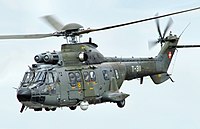
| ||
| Musvitten FKH | Search and Rescue | 2003 | 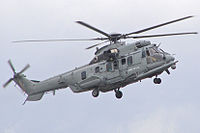
| ||
| Haren FKH | Utility and Attack | 1993 | 
| ||
Asgård Dockyards
The Asgård Dockyards (Tynic Asgård Stålskibsværft) is the primary supplier of ships to the RSN, and the largest shipyard company in Aldinnheim. The state-owned company is a successor to the Royal Shipyard (Kongelige Skibholm) of central Asgård. It is best known for building military vessels for the Sjealandic Navy and others, as well as container ships for the many shipping companies of Asgård. One of its most widely produced ships include the Vilhelm-class coastal defence ship Kystpanserskibet af Vilhelm-klassen, which was a mainstay of many Aldinian navies in the 1920's.
While officially a state-owned company the Asgård Dockyards work in close cooperation with the RSN on introducing and developing ships and systems for use by both the RSN and other ships. One of the newest projects with the most recent focus is the Gungnir Project, a modular payload system, developed originally in the nineties for the Kalum Class Coastal Patrol Vessel and in later years by the majority of ships in the RSN. The system is now currently in use by the RSN, the Ostrinubian navy, Royal Navy of Jorland and Lothican and the Royal Swastrian Navy, with the governments of Endynru and Ambrose planning to introduce the system in 2025.
Many naval scholars and other authorities have attempted to classify world navies, primarily from traditionally naval nations such as Ainin, Tuthina and Sjealand itself. The general terms of brown, green and blue water navies were proposed by Aininian admiral Hervé Coutau-Bégarie based off several common criteria for gauging the capability of navies. These were total displacement and number of ships; modernity and power of weapons and systems; logistical and geographic reach with capacity for sustained operations; and the professional qualifications/disposition of sailors.
This system has been further developed by the Royal Sjealandic Navy, who have adopted his general ideas and systems in a new system made by Sjealandic naval officers Håkon Eriksson and Rikke Vilhelmina. The system outlines ten ranks, distinguished by capability. According to the RSN system a "blue-water navy" is one that can project any sort of power beyond its own territorial waters. However it uses the principle of loss of strength gradient and other criteria to distinguish navies by capability under the four "blue-water" ranks. The six ranks of "Non blue-water navies" can be further broken down into "green-water" and "brown-water navies", and according to to the RSN, these are navies only capable of operating as coastal defence forces, coast guards or riverine forces.
| Rank | Designation | Capabilities | Examples | |
|---|---|---|---|---|
| Blue-water | 1 | Global-reach power projection |
Multiple and sustained power projection missions globally | Ainin |
| 2 | Limited global-reach power projection |
At least one major power projection operation globally | Tuthina, | |
| 3 | Multi-regional power projection |
Power projection to regions adjacent its own | Sjealand, Union of Nautasian Islamic Republics , Akai, Senria | |
| 4 | Regional power projection |
Limited range power projection beyond exclusive economic zone (EEZ) | Xiaodong, Karazawa, Ambrose | |
| Non blue-water | 5 | Regional offshore coastal defence |
Coastal defence within and slightly beyond EEZ | Aurega, Tinza, Nameria |
| 6 | Inshore coastal defence |
Coastal defence confined to inner EEZ | Swastria, Aucuria, Razaria, Jorland and Lothican, Solairise, Hagieria and Agrilan, Eldmark | |
| 7 | Regional offshore constabulary |
Maritime policing within and slightly beyond EEZ | Eibenland, Desena, Mespalia | |
| 8 | Inshore constabulary |
Maritime policing confined well within EEZ | Wosrac, Katranjiev, Kheratia, Siphria, Swastria, Champenia, Sharaf, Jabar, | |
| 9 | Inland waterway riverine |
Riverine defence of landlocked states | Cradebetia, Lecia, | |
| 10 | Token navy riverine |
Very basic constabulary if at all | Charnea, Nautarya, Nunalik |
Titles and Naming
Officially named Kongelige Sjælandske Marine in Tynic, the RSN is named a number of different things both in the public mind and within the armed services. Besides its original name, it is also called Flåden (The Fleet) and Søværnet (The Naval Defence) in public mouth, and often called Søhestene (The Seahorses) as a nickname by the public, in part because of ships originally being called Havheste (Seahorses) in Tynic and because of the equine knigthood granted to the top graduate of any class in the naval academy.
Originally just named Den Kongelige Marine or the Royal Navy, the name was changed in the seventies to further accommodate the navies and fleets of foreign monarchies and to avoid confusion in international operations.
Of the ships
Since 1845 the ships of the Royal Sjealandic Navy have carried the prefix Kongeligt Sjællandsk Skib (Royal Sjealandic Ship) abbreviated to KSS, for example KSS De Ni Riger (The Nine Realms), this prefix is however not carried by Submarines who instead carry the prefix KSU or Kongelig Sjællandsk Undervandsbåd. Names are often chosen in category by the logistical directors of the RSN, and the name itself is then picked by the ships first captain. For example the Skidbladner-class transport ships are all named after the theme A night out, with names such as The Beer and The Drunkard.
Traditionally combat ships carry the names of cities, the 9 Realms or monarchs and inherit the name from earlier ships. The ship-name De Ni Riger has been used by a total of 12 ships and each ship is expected to honour the traditions of those previous.
Customs and Traditions
The RSN maintains several customs and traditions, both regarding to flags and heraldry and to other more down to earth traditions. Many of these date back centuries and have been tinkered with since the inception of the RSN. One of the most famous of these is the Holmen Salutes a series of gun salutes from the historical Naval Base and fortress Holmen a bit upriver. Every day at 8 in the morning as the flag is raised the fortress fires a single gun salute and the same is repeated at sundown. A series of other salutes also exist, like 27 for the monarch, 21 for foreign heads of states and admirals, and the traditional 3 gun salutes fired to greet foreign war-ships, a salute normally returned. Ships of the RNS traditionally fly the swallow-tailed flag at sea, and hangs it as a standard in port. A crew is normally allowed to chose between a normal swallowtail, one carrying the coat of arms of the state and one carrying the coat of arms of their branch as well as other personal distinctions like the emblems on the sides of their ships. These emblems are made by a series of experts from Royal Heraldic Society and are made for every ship produced for the RSN.
A famous tradition of the RSN is the Sommertogt or Summer-expedition, an event that happens every 10 years and includes Grand Naval Parade at Flådestation Nordvakt with ships from foreign nations often invited. The latest Sommertogt took place in 2008 and included ships from the majority of nations on Esquarium.
Religion also plays into many of the traditions of the navy, with Njord being the patron deity of the RSN as well as the god with the most on-ship shrines. Before leaving port a crew often leaves a small sacrifice for Njord, and bind a small rope around their right arm for the duration of the trip to act like a place for Njord to pull them up with should they fall overboard. Priests of Njord also spend 5 years in the RSN, usually acting among other things as an on-ship Gode. Along with Njord, Tyr is celebrated as a general deity for the military, with Tor acting as the god for the individual soldier.
